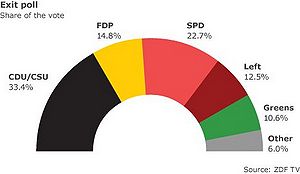Christian Democratic Union

The September 2009 elections were a major win for the conservative forces led by CDU Chancellor Angela Merkel, breaking a stalemate and opening the way for more conservative economic policies. Previously since an indecisive election in 2005 the Christian Democrats (CDU) (on the center-right) formed a "grand coalition" with the Social Democrats (SPD) (on the center-left). Now Merkel and her CDU will form a coalition with the libertarian, pro-business Free Democrats (FDP). Left in the cold will be the SPD, the Greens, and the ex-Communists who remain strong in the former East Germany under the name "Left party". Merkel is now expected to move forward on tax cuts, reform of the tax code, reduction of bureaucracy and a possible extension of the time that nuclear power plants can continue to operate.
Contents
History
The party was founded in post-war Germany by centrist and conservative Christian politicians who wanted to overcome the divisions among democratic Christians politicians in pre-war Germany, which was perceived as one of the reasons of the deadlock in politics during the Weimar Republic. Before 1934 Germany was about 1/3 Catholic. West Germany was now about evenly split between Catholics and Protestants. The CDU (and its sister party the CSU in Bavaria) regularly won about 60% of the catholic vote, and 35-40% of the Protestants. To control a majority in the Bundestag (national parliament) it formed coalitions usually with the small Free Democrats (FDP), a conservative/libertarian party favired by big business and professionals.
Leading figures in the post-war era were Konrad Adenauer and Ludwig Erhard. Adenauer became the first Chancellor in West Germany, and who was seeking firm military and economic integration of West Germany with western Europe and the US. Ludwig Erhard was the first Minister of Economy, renowned for his advocacy and implementation of social market economy, and is considered the father of the German Wirtschaftswunder, the economic boom in the 50s and 60s. These two political concepts, social market economy and integration in the West, have become the two main ideological pillars of the Christian Democratic Union.
It should be noted that under Merkel's leadership, the party has moved more to the political center in recent years. Voters in Germany haven't approved of this new course: although the CDU managed to emerge as the strongest party in both the 2005 and 2009 elections, winning Merkel the chancellorship, their share of the vote was only 35,2% and 33,8%[1], respectively. When running more to the right, as has happened under the leadership of Bavarians Franz Josef Strauss in 1980 or Edmund Stoiber in 2002, the party performed much stronger: in 1980, Strauss almost managed to win an absolute majority; in 2002, Stoiber obtained the best results the CDU has enjoyed in the current five-party-environment. Both candidates only missed the chancellorship because the left-wing social democrats could assemble majority coalitions with smaller centrist parties.
Party Structure
Regional Party Groups
The party has regional party groups, the federal group (Bundesverband, there is only one), the state group(s) (Landesverbände, singular: Landesverband), the county group(s) (Kreisverbände, singular: Kreisverband) and the local group(s) (Ortsverbände, singular: Ortsverband). All local groups in a county (Kreis or Landkreis) are part of the county group, all county groups in a german (federal) state (Land or Bundesland) are part of the state group and all state groups form the federal group.
Federal Leadership
The present chairwoman (of the federal party group) is German chancellor Angela Merkel, vice-chairman are Roland Koch (Minister-President of the federal state of Hesse), Jürgen Rüttgers (former Minister-President of state of North Rhine-Westphalia, now member of the German federal government), Annette Schavan (member of the German federal government) and Christian Wulff (Minister-President of the federal state of Lower Saxony). Ronald Pofalla
Think Tank
The federal party group holds a think tank called Konrad-Adenauer-Stiftung (Konrad Adenauer Foundation), named after first chancellor of post-World War II Germany Konrad Adenauer. The state party groups have similar foundations.
Bavaria
There's a special relationship between the CDU and the Christian Social Union of Bavaria (CSU). The CSU is legally a party of its own, but cooperates closely with the CDU. The CSU only acts in the state of Bavaria and the CDU in the other states. The CSU is independent and has its own political structure and party platform, which differs in some positions from the CDU's one, so that the CSU can be considered more conservative. The most prominent politician of the CSU was Franz-Josef Strauss.
The CDU has special organizations for demographic groups (youth, women, older/retired citizens, etc.).
Famous Party Members
- Konrad Adenauer, first chancellor of the Federal Republic of Germany
- Helmut Kohl, former chancellor of Germany
- Angela Merkel, present chancellor of Germany, present chairwoman of the CDU
External Links
References
- ↑ http://www.bundeswahlleiter.de/de/bundestagswahlen/ Official results of the 2005 and 2009 federal elections (in German)
